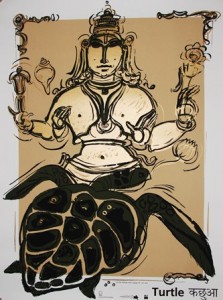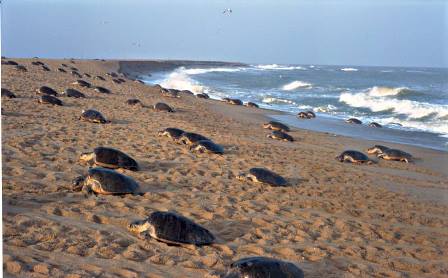The noted artist donated his depiction of Olive Ridley turtles as Vishnu’s ‘Kurma’ avatar in 2010, many serigraphs unsold yet.
by The Editors | editor@themetrognome.in
Every year, Olive Ridley turtles turn up at Odisha for mass nesting. This is a sight too wonderful for words, and it always invites artistes and photographers to capture the image for eternity.
In 2010, however, noted artist Jatin Das made a visit to Rushikulya in Odisha during the mass nesting season, and inspired by the sight, made a special serigraph (art on a silk screen) depicting the Olive Ridley turtle as Vishnu in his ‘Kurma’ avatar. The serigraph was given as a donation to the Dakshin Foundation in a series of 500. Numbered and signed serigraphs are normally quite expensive, but this special edition sells at Rs 10,000 each to forward the cause of marine conservation. The unsigned serigraphs are sold at Rs 1,000 each. However, several of the serigraphs are still unsold.
In an email interview with The Metrognome, the Dakshin Foundation’s Dr Karthik Shanker and Murali M explained the concept of the serigraphs and why the artwork is important. Excerpts:
How was this project conceived?
Dakshin Foundation and the International Sea Turtle Society (ISTS) approached Jatin Das with the prospect of making an artwork for the occasion of the 30th annual Sea Turtle Symposium in Goa in 2010. This was in keeping with the tradition of creating a special memento for the Symposium which is held at a different location each year. The 30th Symposium was held in Asia for the first time and was co-hosted by Dakshin Foundation and the ISTS.
How did you get artist Jatin Das on board?
 Jatin Das was contacted with the proposal and invited to Dakshin Foundation’s field station in Odisha to witness the mass nesting of Olive Ridley turtles, a grand phenomenon also known as an arribada (Spanish for ‘arrival’). Of the seven surviving species of sea turtles, only two species of Ridleys (Olive and Kemp’s) nest simultaneously in large numbers on specific beaches. Jatin Das himself was born in Odisha. On witnessing this unique event in 2010, he created the serigraph depicting the Olive Ridley as the ‘Kurma’ avatar of Vishnu.
Jatin Das was contacted with the proposal and invited to Dakshin Foundation’s field station in Odisha to witness the mass nesting of Olive Ridley turtles, a grand phenomenon also known as an arribada (Spanish for ‘arrival’). Of the seven surviving species of sea turtles, only two species of Ridleys (Olive and Kemp’s) nest simultaneously in large numbers on specific beaches. Jatin Das himself was born in Odisha. On witnessing this unique event in 2010, he created the serigraph depicting the Olive Ridley as the ‘Kurma’ avatar of Vishnu.
Are there many artists working with serigraphs today?
As per our information, not many artists work on serigraphs. However, some very prominent artists such as Pablo Picasso, Henri Matisse, Andy Warhol, MF Husain, FN Souza and SH Raza have brought out serigraphs. Serigraphy is a versatile, elaborate and intricate technique. As the Saffronart blog puts it, ‘serigraphs are a great way for art lovers and art investors to start collecting, because they cost a fraction of the price of the paintings or other works of renowned artists’. Also, limited edition and signed serigraphs are a good investment as their value increases over time.
What is the current status of the project?
The project was completed in 2010 itself, albeit a couple of days after the Symposium ended. Hence, the serigraphs were not sold out.
How many serigraphs have been sold yet?
Not many serigraphs have been sold. We are still in possession of 500 signed serigraphs and 60 unsigned ones.
What are you doing to spread awareness about the project, and about Olive Ridley turtles in general?
We have a dedicated outreach and awareness programme as part of the Sea Turtle project. Direct efforts include publication and distribution of various posters, books and manuals to schoolchildren, forest departments and a network of NGO partners working on sea turtles and coastal conservation (Turtle Action Group).
To buy the special edition Jatin Das serigraphs depicting Olive Ridley turtles, contact Dr Shanker at kshanker@ces.iisc.ernet.in or call Dakshin Foundation at +91 80 42113509.




